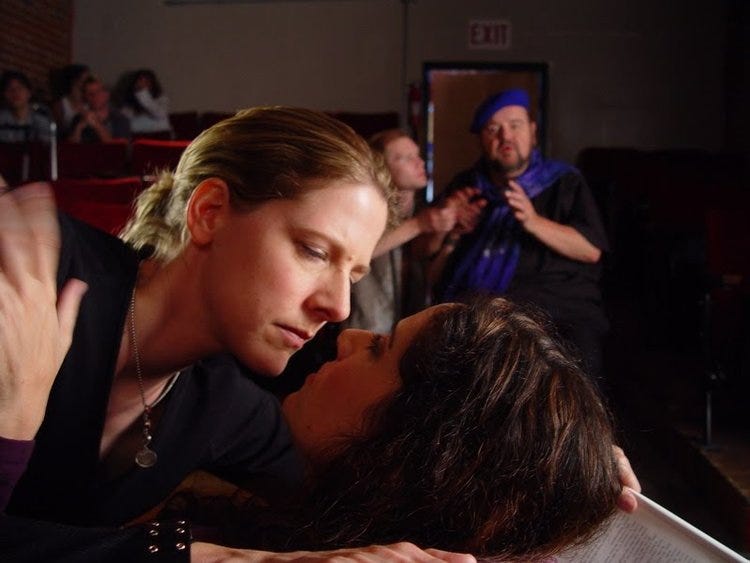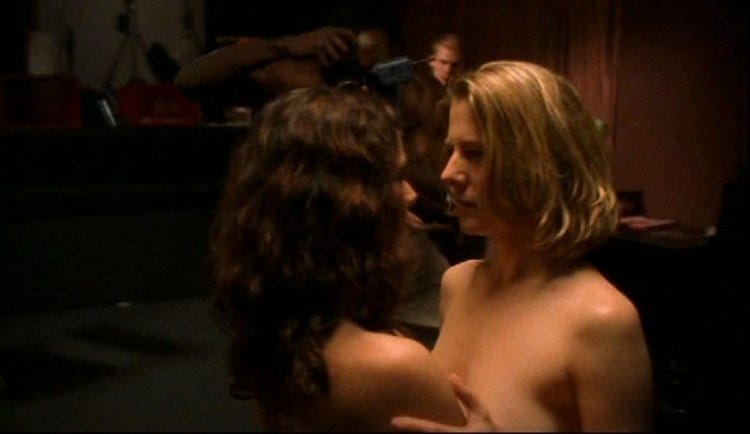girl play
Film, 2004, 3.5 stars
Directed: Lee Friedlander
Written: Lee Friedlander, Robin Greenspan, Lacie Harmon
Two comediennes, while rehearsing for a play, find that they have an irresistable connection. It's a simple idea, based on the real life experiences of the actors involved, which despite a few flaws is pulled off in an engaging, sweet and suprisingly sexy way.
The concept of the film is this: what do you do if you're already in a committed relationship when you meet the love of your life? Also, after being disappointed many times, is it possible to put aside your cynicism about relationships to jump at the chance of real love?
It is obvious that Girl Play is a film based on a play. The vast majority of the film takes place on a sparse stage with the protagonists, Robin and Lacie, standing side by side narrating their stories to the camera. Robin is the woman in the six-year relationship with her lover, Audrey, and Lacie is the one with the fear of commitment. During these scenes the proscenium arch is strictly preserved and it feels very much like you're sitting in a theatre rather than a cinema. This is dialogue-driven filmmaking at its most extreme.
As the characters tell their stories the action shifts away occasionally to re-enact the narrated events. It is in these scenes the film really kicks into gear. The humour comes not from cleverly-written dialogue (though it is), it comes from the familiarity and empathy we feel for the characters as their experiences unfold. We relate to embarrassing sexual experiences, explaining your actions to a jealous lover, coming out to parents who react in unexpected ways, giving a hug to a friend and realising friendship has crossed the line into sexual tension. All these events are everyday things that are milked here for comedy gold.
Perhaps the weakest moments are when the story veers away and introduces extraneous characters. I laughed at the coming-out sequence and thought it was a nice way of explaining where Robin was coming from, but it could have been sacrificed in favour of more sequences showing the women and their interactions. If I have a beef it is that the film didn't more thoroughly explore the inner workings of the protagonists' growing attraction to each other.
Alternatively, more time could have been spent examining some of the good moments of Robin and Audrey's relationship and why it was so difficult for Robin to leave. All we saw were the reasons their relationship was falling apart so it was difficult to get a sense of what the two women were like when they were in love.
Of the two storylines I think I enjoyed Lacie's the most. The demise of her previous relationship and her harrowing-yet-humorous discovery that she almost dreaded having sex with her girlfriend resonated with me. At times I was trying to sort out whether I was enjoying the film because it was genuinely well made or because of my personal affinity with the subject matter. I can't help thinking, was I tricked into liking this movie so much?
I don't think talking heads is a film technique that will catch on. While the approach worked for this film, it wasn't so much a narrative film as a docudrama of lives and relationships. Picture a group of lesbians sitting around a campfire to talk about love, relationships, commitment and coming out. What stories might they tell? I think it would be a little like this.
Perhaps more of a screenwriting effort was required to truly translate the film for the screen, but it seems Harmon and Greenspan wanted to capture the play pretty much as-is, with only minor meddling to take advantage of the film format. Whatever the reason, their approach did produce an emotional response and provoke some genuine belly laughs, so I would say overall this was a mission well accomplished.
Note: The singer in the bar who seems too good to be there? Yep, that's Sara Bareilles.



